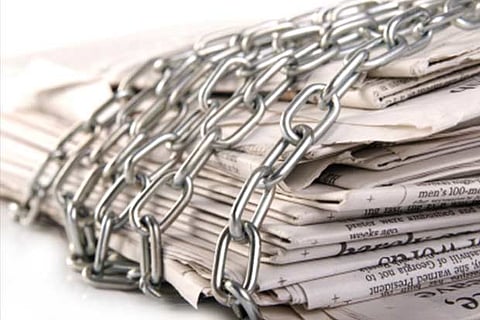

New Delhi
In its annual World Press Freedom Index, Reporters Without Borders has ranked India at 136 of 180 countries. The country's ranking has slipped by three spots from last year's 133rd ranking.
"With Hindu nationalists trying to purge all manifestations of 'anti-national' thought from the national debate, self-censorship is growing in the mainstream (Indian) media," said the report, which has painted a grim picture for the press globally.
The section on India was titled ‘Threat from (Prime Minister Narendra) Modi's nationalism’.
The report warns of a general media freedom erosion in democratic countries, including the US, which has always been hailed as a haven of freedom of speech. The US has slipped to 43rd place, Canada to 22nd and New Zealand to 13th.
Norway is ranked first, followed by Sweden and Finland. "The rate at which democracies are approaching the tipping point is alarming for all those who understand that if media freedom is not secure, then none of the other freedoms can be guaranteed," the watchdog's Secretary General, Christophe Deloire, said in Paris on Wednesday.
Afghanistan, Palestine, Uganda and Algeria rank higher than India in the media freedom index. Pakistan is ranked at 139, three places below India, Bangladesh at 146, Russia at 148 and China at 176.
For India, the report says journalists were ‘increasingly’ becoming the targets of online smear campaigns by "the most radical nationalists, who vilify them and even threaten physical reprisals". "Prosecutions are also used to gag journalists who are overly critical of the government, with some prosecutors invoking Section 124a of the penal code, under which 'sedition' is punishable by life imprisonment," it said.
However, it pointed out that no journalist in India has been convicted of sedition "but the threat encourages self-censorship". It said the media freedom had taken a hit after the government introduced ‘new foreign funding regulations to limit international influence’.
It highlights reporting difficulties in the troubled Jammu and Kashmir. "Coverage of regions that the authorities regard as sensitive, such as Kashmir, continues to be very difficult, and there are no protective mechanisms."
The report said internet curbs in the Kashmir Valley prevented "communication between protesters and prevent coverage by the media and citizen journalists" on the first day of a wave of protests in Kashmir in July 2016 when Hizbul Mujahideen militant Burhan Wani was killed.
"Journalists working for local media outlets are often the targets of violence by soldiers acting with the central government's tacit consent."
Visit news.dtnext.in to explore our interactive epaper!
Download the DT Next app for more exciting features!
Click here for iOS
Click here for Android